A Comparative Study of Brand Loyalty: Coca Cola and PepsiCo
VerifiedAdded on 2020/11/12
|39
|13790
|131
Report
AI Summary
This report presents a comparative analysis of brand loyalty and emotional loyalty, focusing on Coca-Cola and PepsiCo. The study explores the concepts of brand loyalty and emotional loyalty, examining how these factors influence customer retention and overall business performance in the beverage industry. The research investigates the key factors that drive emotional loyalty and their impact on brand loyalty, analyzing how these two companies have established and maintained customer loyalty. The report includes a literature review, research methodology, findings, analysis, and discussion, highlighting the strategies employed by Coca-Cola and PepsiCo to foster brand and emotional connections with consumers. It also identifies different ways these companies could enhance brand loyalty. The report concludes with recommendations and a reflection on the findings, offering valuable insights into the dynamics of brand loyalty in a competitive market.
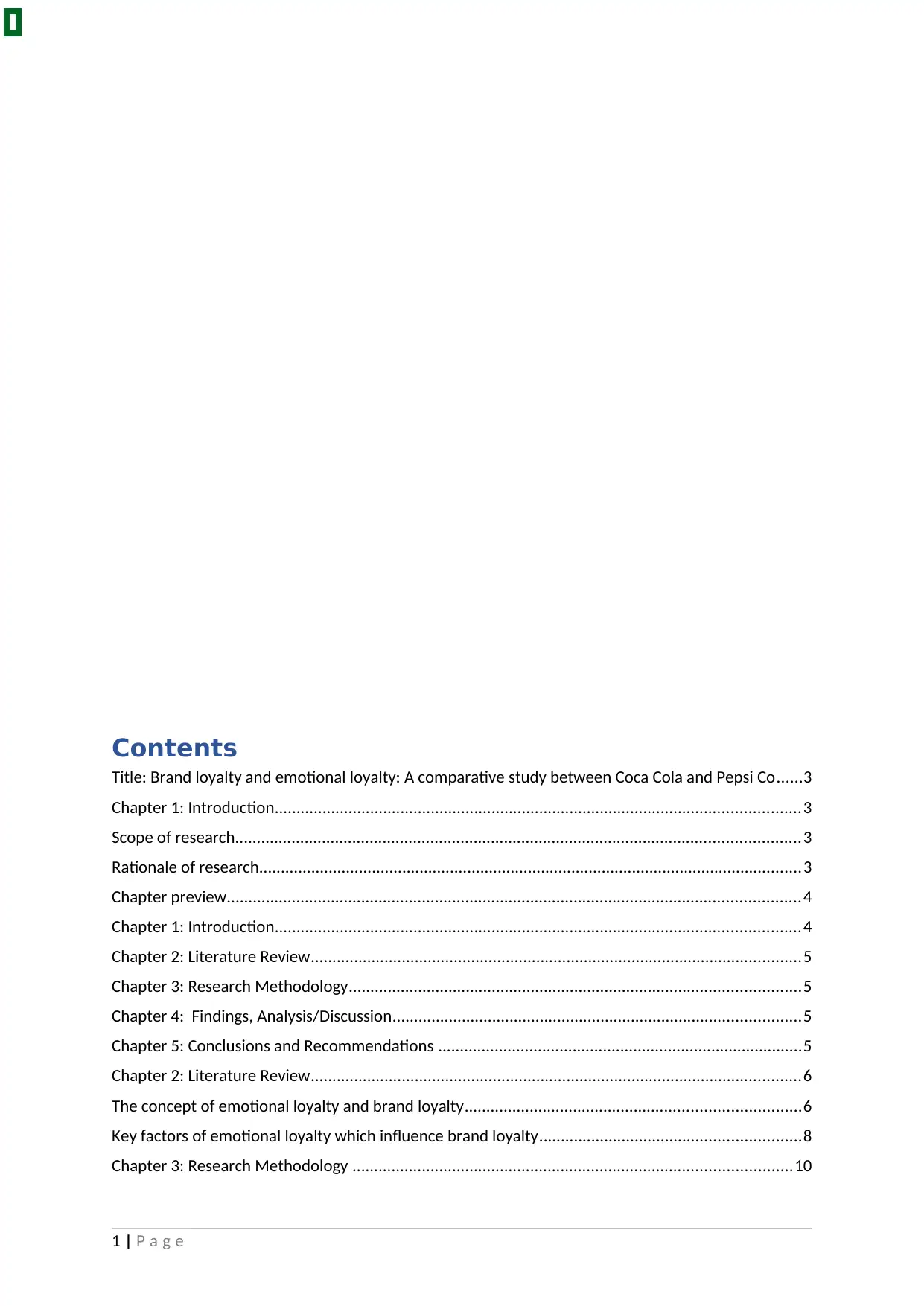
Contents
Title: Brand loyalty and emotional loyalty: A comparative study between Coca Cola and Pepsi Co......3
Chapter 1: Introduction.........................................................................................................................3
Scope of research..................................................................................................................................3
Rationale of research.............................................................................................................................3
Chapter preview....................................................................................................................................4
Chapter 1: Introduction.........................................................................................................................4
Chapter 2: Literature Review.................................................................................................................5
Chapter 3: Research Methodology........................................................................................................5
Chapter 4: Findings, Analysis/Discussion..............................................................................................5
Chapter 5: Conclusions and Recommendations ....................................................................................5
Chapter 2: Literature Review.................................................................................................................6
The concept of emotional loyalty and brand loyalty.............................................................................6
Key factors of emotional loyalty which influence brand loyalty............................................................8
Chapter 3: Research Methodology .....................................................................................................10
1 | P a g e
Title: Brand loyalty and emotional loyalty: A comparative study between Coca Cola and Pepsi Co......3
Chapter 1: Introduction.........................................................................................................................3
Scope of research..................................................................................................................................3
Rationale of research.............................................................................................................................3
Chapter preview....................................................................................................................................4
Chapter 1: Introduction.........................................................................................................................4
Chapter 2: Literature Review.................................................................................................................5
Chapter 3: Research Methodology........................................................................................................5
Chapter 4: Findings, Analysis/Discussion..............................................................................................5
Chapter 5: Conclusions and Recommendations ....................................................................................5
Chapter 2: Literature Review.................................................................................................................6
The concept of emotional loyalty and brand loyalty.............................................................................6
Key factors of emotional loyalty which influence brand loyalty............................................................8
Chapter 3: Research Methodology .....................................................................................................10
1 | P a g e
Paraphrase This Document
Need a fresh take? Get an instant paraphrase of this document with our AI Paraphraser
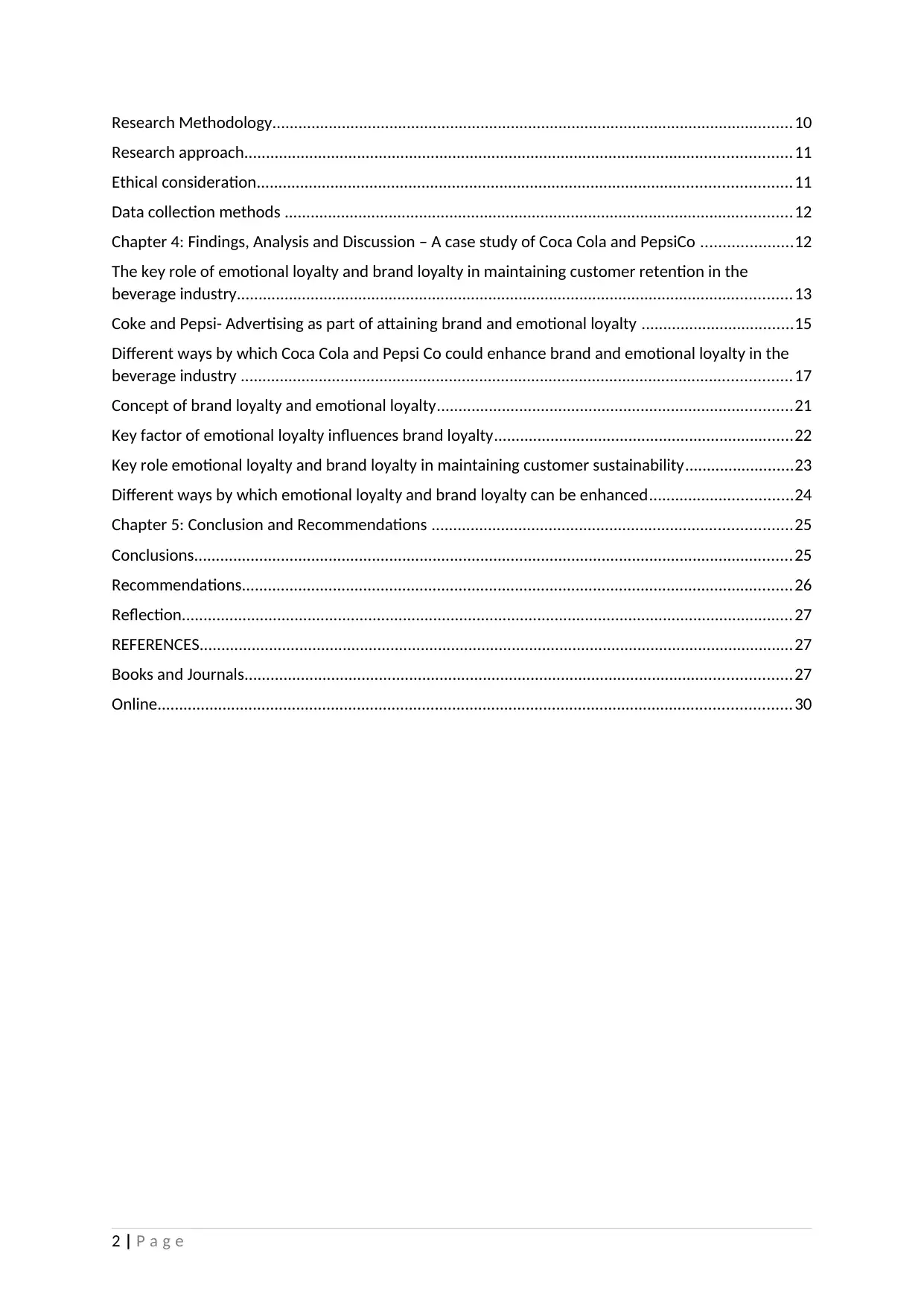
Research Methodology........................................................................................................................10
Research approach..............................................................................................................................11
Ethical consideration...........................................................................................................................11
Data collection methods .....................................................................................................................12
Chapter 4: Findings, Analysis and Discussion – A case study of Coca Cola and PepsiCo .....................12
The key role of emotional loyalty and brand loyalty in maintaining customer retention in the
beverage industry................................................................................................................................13
Coke and Pepsi- Advertising as part of attaining brand and emotional loyalty ...................................15
Different ways by which Coca Cola and Pepsi Co could enhance brand and emotional loyalty in the
beverage industry ...............................................................................................................................17
Concept of brand loyalty and emotional loyalty..................................................................................21
Key factor of emotional loyalty influences brand loyalty.....................................................................22
Key role emotional loyalty and brand loyalty in maintaining customer sustainability.........................23
Different ways by which emotional loyalty and brand loyalty can be enhanced.................................24
Chapter 5: Conclusion and Recommendations ...................................................................................25
Conclusions..........................................................................................................................................25
Recommendations...............................................................................................................................26
Reflection.............................................................................................................................................27
REFERENCES.........................................................................................................................................27
Books and Journals..............................................................................................................................27
Online..................................................................................................................................................30
2 | P a g e
Research approach..............................................................................................................................11
Ethical consideration...........................................................................................................................11
Data collection methods .....................................................................................................................12
Chapter 4: Findings, Analysis and Discussion – A case study of Coca Cola and PepsiCo .....................12
The key role of emotional loyalty and brand loyalty in maintaining customer retention in the
beverage industry................................................................................................................................13
Coke and Pepsi- Advertising as part of attaining brand and emotional loyalty ...................................15
Different ways by which Coca Cola and Pepsi Co could enhance brand and emotional loyalty in the
beverage industry ...............................................................................................................................17
Concept of brand loyalty and emotional loyalty..................................................................................21
Key factor of emotional loyalty influences brand loyalty.....................................................................22
Key role emotional loyalty and brand loyalty in maintaining customer sustainability.........................23
Different ways by which emotional loyalty and brand loyalty can be enhanced.................................24
Chapter 5: Conclusion and Recommendations ...................................................................................25
Conclusions..........................................................................................................................................25
Recommendations...............................................................................................................................26
Reflection.............................................................................................................................................27
REFERENCES.........................................................................................................................................27
Books and Journals..............................................................................................................................27
Online..................................................................................................................................................30
2 | P a g e
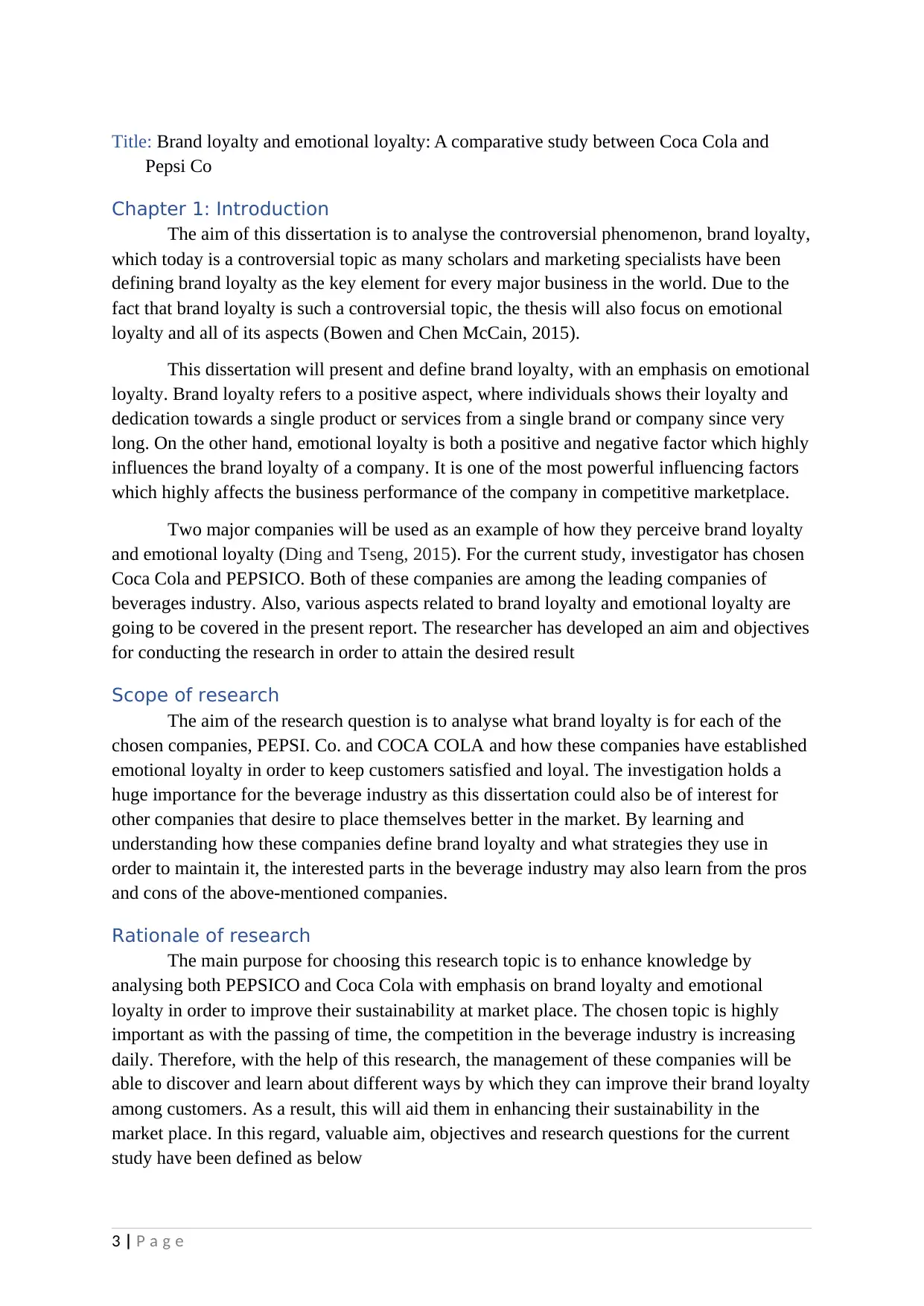
Title: Brand loyalty and emotional loyalty: A comparative study between Coca Cola and
Pepsi Co
Chapter 1: Introduction
The aim of this dissertation is to analyse the controversial phenomenon, brand loyalty,
which today is a controversial topic as many scholars and marketing specialists have been
defining brand loyalty as the key element for every major business in the world. Due to the
fact that brand loyalty is such a controversial topic, the thesis will also focus on emotional
loyalty and all of its aspects (Bowen and Chen McCain, 2015).
This dissertation will present and define brand loyalty, with an emphasis on emotional
loyalty. Brand loyalty refers to a positive aspect, where individuals shows their loyalty and
dedication towards a single product or services from a single brand or company since very
long. On the other hand, emotional loyalty is both a positive and negative factor which highly
influences the brand loyalty of a company. It is one of the most powerful influencing factors
which highly affects the business performance of the company in competitive marketplace.
Two major companies will be used as an example of how they perceive brand loyalty
and emotional loyalty (Ding and Tseng, 2015). For the current study, investigator has chosen
Coca Cola and PEPSICO. Both of these companies are among the leading companies of
beverages industry. Also, various aspects related to brand loyalty and emotional loyalty are
going to be covered in the present report. The researcher has developed an aim and objectives
for conducting the research in order to attain the desired result
Scope of research
The aim of the research question is to analyse what brand loyalty is for each of the
chosen companies, PEPSI. Co. and COCA COLA and how these companies have established
emotional loyalty in order to keep customers satisfied and loyal. The investigation holds a
huge importance for the beverage industry as this dissertation could also be of interest for
other companies that desire to place themselves better in the market. By learning and
understanding how these companies define brand loyalty and what strategies they use in
order to maintain it, the interested parts in the beverage industry may also learn from the pros
and cons of the above-mentioned companies.
Rationale of research
The main purpose for choosing this research topic is to enhance knowledge by
analysing both PEPSICO and Coca Cola with emphasis on brand loyalty and emotional
loyalty in order to improve their sustainability at market place. The chosen topic is highly
important as with the passing of time, the competition in the beverage industry is increasing
daily. Therefore, with the help of this research, the management of these companies will be
able to discover and learn about different ways by which they can improve their brand loyalty
among customers. As a result, this will aid them in enhancing their sustainability in the
market place. In this regard, valuable aim, objectives and research questions for the current
study have been defined as below
3 | P a g e
Pepsi Co
Chapter 1: Introduction
The aim of this dissertation is to analyse the controversial phenomenon, brand loyalty,
which today is a controversial topic as many scholars and marketing specialists have been
defining brand loyalty as the key element for every major business in the world. Due to the
fact that brand loyalty is such a controversial topic, the thesis will also focus on emotional
loyalty and all of its aspects (Bowen and Chen McCain, 2015).
This dissertation will present and define brand loyalty, with an emphasis on emotional
loyalty. Brand loyalty refers to a positive aspect, where individuals shows their loyalty and
dedication towards a single product or services from a single brand or company since very
long. On the other hand, emotional loyalty is both a positive and negative factor which highly
influences the brand loyalty of a company. It is one of the most powerful influencing factors
which highly affects the business performance of the company in competitive marketplace.
Two major companies will be used as an example of how they perceive brand loyalty
and emotional loyalty (Ding and Tseng, 2015). For the current study, investigator has chosen
Coca Cola and PEPSICO. Both of these companies are among the leading companies of
beverages industry. Also, various aspects related to brand loyalty and emotional loyalty are
going to be covered in the present report. The researcher has developed an aim and objectives
for conducting the research in order to attain the desired result
Scope of research
The aim of the research question is to analyse what brand loyalty is for each of the
chosen companies, PEPSI. Co. and COCA COLA and how these companies have established
emotional loyalty in order to keep customers satisfied and loyal. The investigation holds a
huge importance for the beverage industry as this dissertation could also be of interest for
other companies that desire to place themselves better in the market. By learning and
understanding how these companies define brand loyalty and what strategies they use in
order to maintain it, the interested parts in the beverage industry may also learn from the pros
and cons of the above-mentioned companies.
Rationale of research
The main purpose for choosing this research topic is to enhance knowledge by
analysing both PEPSICO and Coca Cola with emphasis on brand loyalty and emotional
loyalty in order to improve their sustainability at market place. The chosen topic is highly
important as with the passing of time, the competition in the beverage industry is increasing
daily. Therefore, with the help of this research, the management of these companies will be
able to discover and learn about different ways by which they can improve their brand loyalty
among customers. As a result, this will aid them in enhancing their sustainability in the
market place. In this regard, valuable aim, objectives and research questions for the current
study have been defined as below
3 | P a g e
⊘ This is a preview!⊘
Do you want full access?
Subscribe today to unlock all pages.

Trusted by 1+ million students worldwide
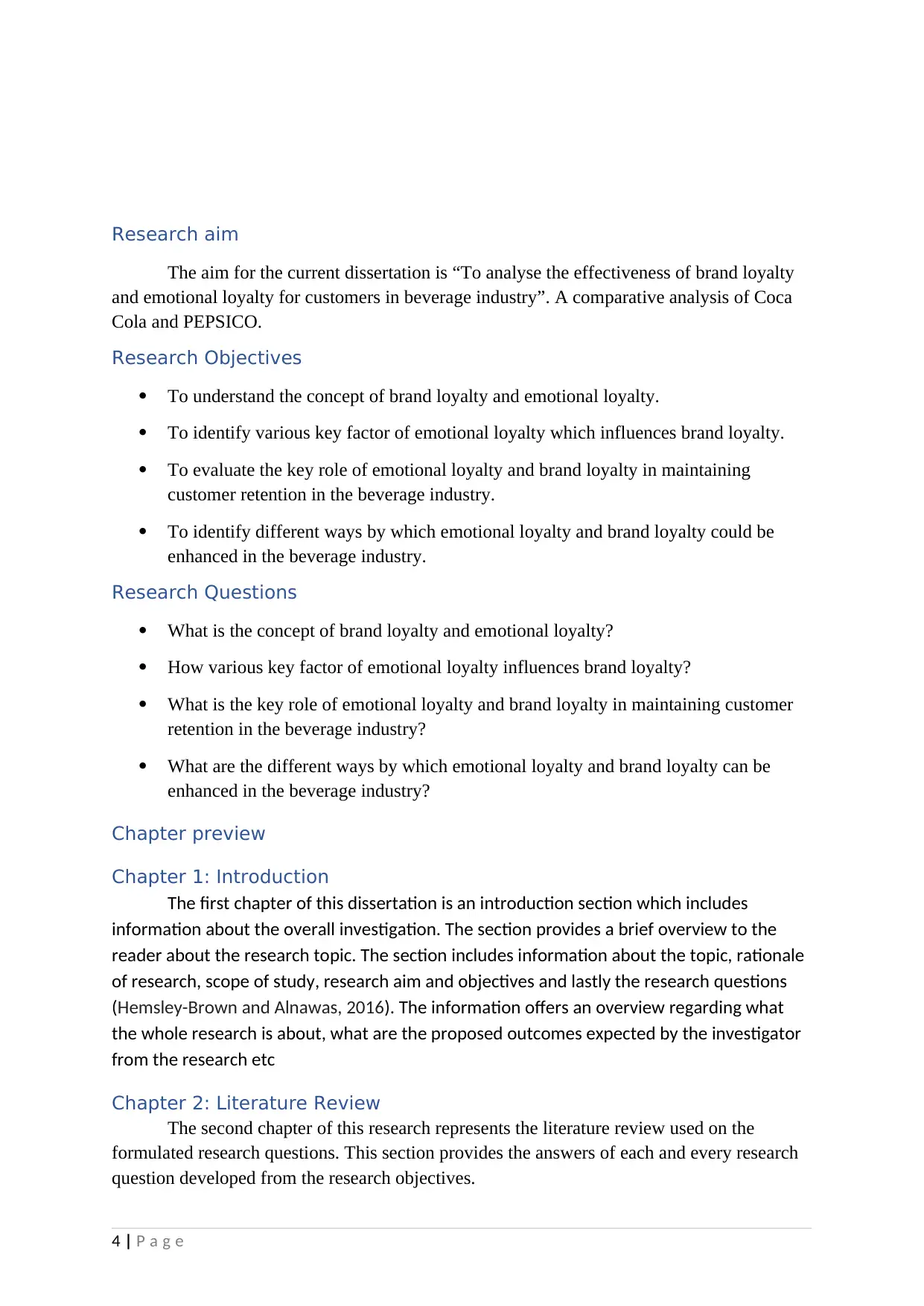
Research aim
The aim for the current dissertation is “To analyse the effectiveness of brand loyalty
and emotional loyalty for customers in beverage industry”. A comparative analysis of Coca
Cola and PEPSICO.
Research Objectives
To understand the concept of brand loyalty and emotional loyalty.
To identify various key factor of emotional loyalty which influences brand loyalty.
To evaluate the key role of emotional loyalty and brand loyalty in maintaining
customer retention in the beverage industry.
To identify different ways by which emotional loyalty and brand loyalty could be
enhanced in the beverage industry.
Research Questions
What is the concept of brand loyalty and emotional loyalty?
How various key factor of emotional loyalty influences brand loyalty?
What is the key role of emotional loyalty and brand loyalty in maintaining customer
retention in the beverage industry?
What are the different ways by which emotional loyalty and brand loyalty can be
enhanced in the beverage industry?
Chapter preview
Chapter 1: Introduction
The first chapter of this dissertation is an introduction section which includes
information about the overall investigation. The section provides a brief overview to the
reader about the research topic. The section includes information about the topic, rationale
of research, scope of study, research aim and objectives and lastly the research questions
(Hemsley-Brown and Alnawas, 2016). The information offers an overview regarding what
the whole research is about, what are the proposed outcomes expected by the investigator
from the research etc
Chapter 2: Literature Review
The second chapter of this research represents the literature review used on the
formulated research questions. This section provides the answers of each and every research
question developed from the research objectives.
4 | P a g e
The aim for the current dissertation is “To analyse the effectiveness of brand loyalty
and emotional loyalty for customers in beverage industry”. A comparative analysis of Coca
Cola and PEPSICO.
Research Objectives
To understand the concept of brand loyalty and emotional loyalty.
To identify various key factor of emotional loyalty which influences brand loyalty.
To evaluate the key role of emotional loyalty and brand loyalty in maintaining
customer retention in the beverage industry.
To identify different ways by which emotional loyalty and brand loyalty could be
enhanced in the beverage industry.
Research Questions
What is the concept of brand loyalty and emotional loyalty?
How various key factor of emotional loyalty influences brand loyalty?
What is the key role of emotional loyalty and brand loyalty in maintaining customer
retention in the beverage industry?
What are the different ways by which emotional loyalty and brand loyalty can be
enhanced in the beverage industry?
Chapter preview
Chapter 1: Introduction
The first chapter of this dissertation is an introduction section which includes
information about the overall investigation. The section provides a brief overview to the
reader about the research topic. The section includes information about the topic, rationale
of research, scope of study, research aim and objectives and lastly the research questions
(Hemsley-Brown and Alnawas, 2016). The information offers an overview regarding what
the whole research is about, what are the proposed outcomes expected by the investigator
from the research etc
Chapter 2: Literature Review
The second chapter of this research represents the literature review used on the
formulated research questions. This section provides the answers of each and every research
question developed from the research objectives.
4 | P a g e
Paraphrase This Document
Need a fresh take? Get an instant paraphrase of this document with our AI Paraphraser
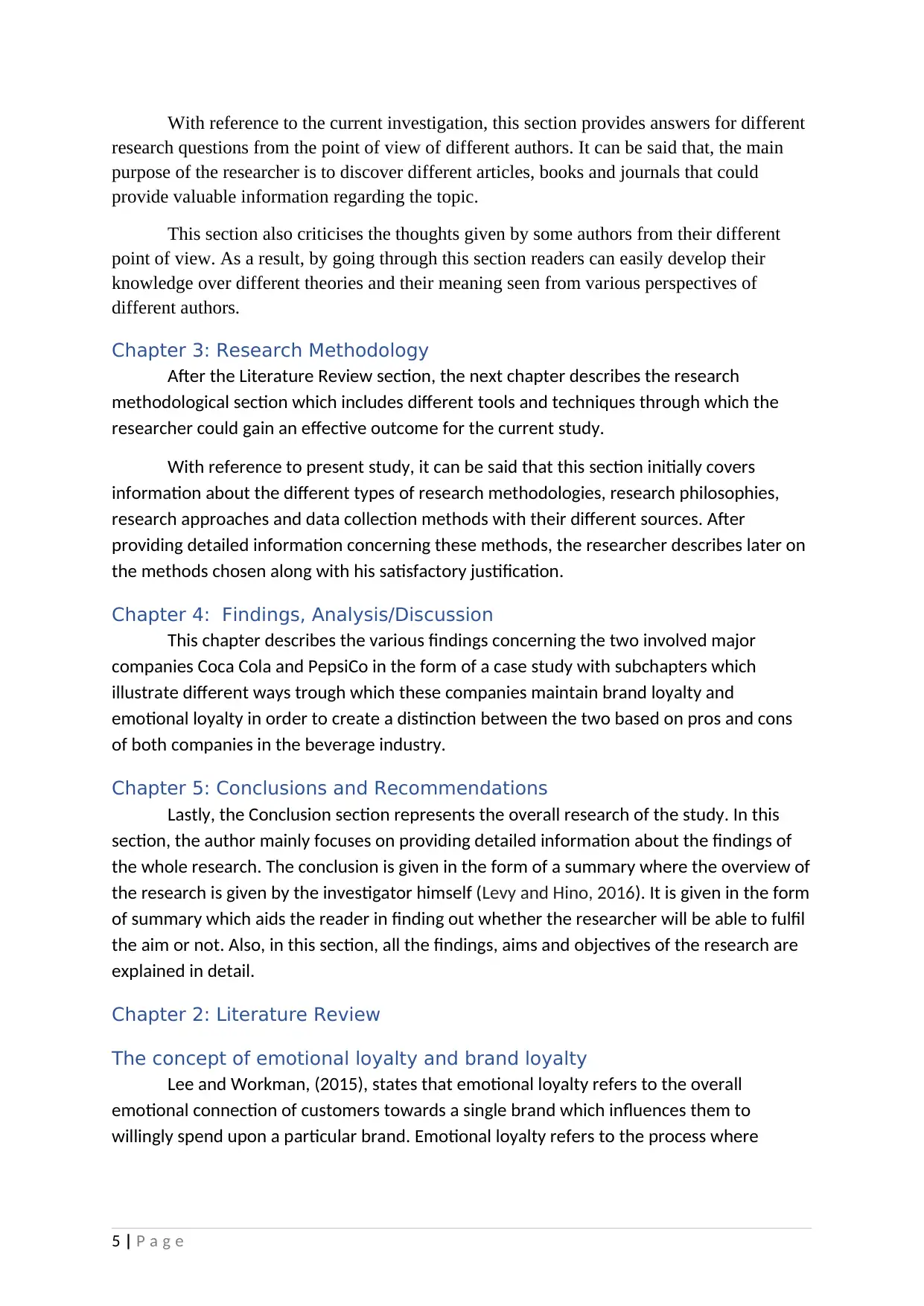
With reference to the current investigation, this section provides answers for different
research questions from the point of view of different authors. It can be said that, the main
purpose of the researcher is to discover different articles, books and journals that could
provide valuable information regarding the topic.
This section also criticises the thoughts given by some authors from their different
point of view. As a result, by going through this section readers can easily develop their
knowledge over different theories and their meaning seen from various perspectives of
different authors.
Chapter 3: Research Methodology
After the Literature Review section, the next chapter describes the research
methodological section which includes different tools and techniques through which the
researcher could gain an effective outcome for the current study.
With reference to present study, it can be said that this section initially covers
information about the different types of research methodologies, research philosophies,
research approaches and data collection methods with their different sources. After
providing detailed information concerning these methods, the researcher describes later on
the methods chosen along with his satisfactory justification.
Chapter 4: Findings, Analysis/Discussion
This chapter describes the various findings concerning the two involved major
companies Coca Cola and PepsiCo in the form of a case study with subchapters which
illustrate different ways trough which these companies maintain brand loyalty and
emotional loyalty in order to create a distinction between the two based on pros and cons
of both companies in the beverage industry.
Chapter 5: Conclusions and Recommendations
Lastly, the Conclusion section represents the overall research of the study. In this
section, the author mainly focuses on providing detailed information about the findings of
the whole research. The conclusion is given in the form of a summary where the overview of
the research is given by the investigator himself (Levy and Hino, 2016). It is given in the form
of summary which aids the reader in finding out whether the researcher will be able to fulfil
the aim or not. Also, in this section, all the findings, aims and objectives of the research are
explained in detail.
Chapter 2: Literature Review
The concept of emotional loyalty and brand loyalty
Lee and Workman, (2015), states that emotional loyalty refers to the overall
emotional connection of customers towards a single brand which influences them to
willingly spend upon a particular brand. Emotional loyalty refers to the process where
5 | P a g e
research questions from the point of view of different authors. It can be said that, the main
purpose of the researcher is to discover different articles, books and journals that could
provide valuable information regarding the topic.
This section also criticises the thoughts given by some authors from their different
point of view. As a result, by going through this section readers can easily develop their
knowledge over different theories and their meaning seen from various perspectives of
different authors.
Chapter 3: Research Methodology
After the Literature Review section, the next chapter describes the research
methodological section which includes different tools and techniques through which the
researcher could gain an effective outcome for the current study.
With reference to present study, it can be said that this section initially covers
information about the different types of research methodologies, research philosophies,
research approaches and data collection methods with their different sources. After
providing detailed information concerning these methods, the researcher describes later on
the methods chosen along with his satisfactory justification.
Chapter 4: Findings, Analysis/Discussion
This chapter describes the various findings concerning the two involved major
companies Coca Cola and PepsiCo in the form of a case study with subchapters which
illustrate different ways trough which these companies maintain brand loyalty and
emotional loyalty in order to create a distinction between the two based on pros and cons
of both companies in the beverage industry.
Chapter 5: Conclusions and Recommendations
Lastly, the Conclusion section represents the overall research of the study. In this
section, the author mainly focuses on providing detailed information about the findings of
the whole research. The conclusion is given in the form of a summary where the overview of
the research is given by the investigator himself (Levy and Hino, 2016). It is given in the form
of summary which aids the reader in finding out whether the researcher will be able to fulfil
the aim or not. Also, in this section, all the findings, aims and objectives of the research are
explained in detail.
Chapter 2: Literature Review
The concept of emotional loyalty and brand loyalty
Lee and Workman, (2015), states that emotional loyalty refers to the overall
emotional connection of customers towards a single brand which influences them to
willingly spend upon a particular brand. Emotional loyalty refers to the process where
5 | P a g e
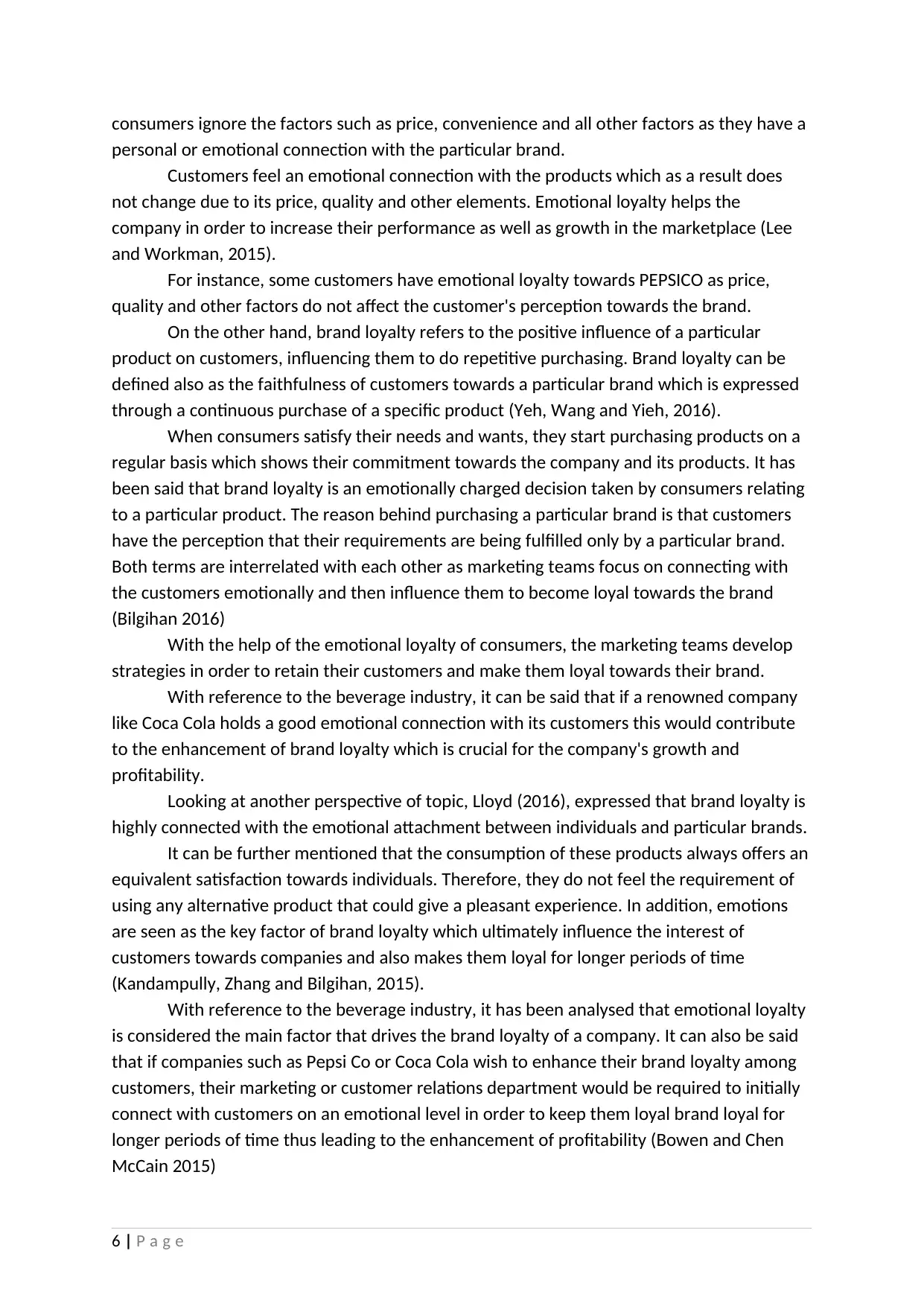
consumers ignore the factors such as price, convenience and all other factors as they have a
personal or emotional connection with the particular brand.
Customers feel an emotional connection with the products which as a result does
not change due to its price, quality and other elements. Emotional loyalty helps the
company in order to increase their performance as well as growth in the marketplace (Lee
and Workman, 2015).
For instance, some customers have emotional loyalty towards PEPSICO as price,
quality and other factors do not affect the customer's perception towards the brand.
On the other hand, brand loyalty refers to the positive influence of a particular
product on customers, influencing them to do repetitive purchasing. Brand loyalty can be
defined also as the faithfulness of customers towards a particular brand which is expressed
through a continuous purchase of a specific product (Yeh, Wang and Yieh, 2016).
When consumers satisfy their needs and wants, they start purchasing products on a
regular basis which shows their commitment towards the company and its products. It has
been said that brand loyalty is an emotionally charged decision taken by consumers relating
to a particular product. The reason behind purchasing a particular brand is that customers
have the perception that their requirements are being fulfilled only by a particular brand.
Both terms are interrelated with each other as marketing teams focus on connecting with
the customers emotionally and then influence them to become loyal towards the brand
(Bilgihan 2016)
With the help of the emotional loyalty of consumers, the marketing teams develop
strategies in order to retain their customers and make them loyal towards their brand.
With reference to the beverage industry, it can be said that if a renowned company
like Coca Cola holds a good emotional connection with its customers this would contribute
to the enhancement of brand loyalty which is crucial for the company's growth and
profitability.
Looking at another perspective of topic, Lloyd (2016), expressed that brand loyalty is
highly connected with the emotional attachment between individuals and particular brands.
It can be further mentioned that the consumption of these products always offers an
equivalent satisfaction towards individuals. Therefore, they do not feel the requirement of
using any alternative product that could give a pleasant experience. In addition, emotions
are seen as the key factor of brand loyalty which ultimately influence the interest of
customers towards companies and also makes them loyal for longer periods of time
(Kandampully, Zhang and Bilgihan, 2015).
With reference to the beverage industry, it has been analysed that emotional loyalty
is considered the main factor that drives the brand loyalty of a company. It can also be said
that if companies such as Pepsi Co or Coca Cola wish to enhance their brand loyalty among
customers, their marketing or customer relations department would be required to initially
connect with customers on an emotional level in order to keep them loyal brand loyal for
longer periods of time thus leading to the enhancement of profitability (Bowen and Chen
McCain 2015)
6 | P a g e
personal or emotional connection with the particular brand.
Customers feel an emotional connection with the products which as a result does
not change due to its price, quality and other elements. Emotional loyalty helps the
company in order to increase their performance as well as growth in the marketplace (Lee
and Workman, 2015).
For instance, some customers have emotional loyalty towards PEPSICO as price,
quality and other factors do not affect the customer's perception towards the brand.
On the other hand, brand loyalty refers to the positive influence of a particular
product on customers, influencing them to do repetitive purchasing. Brand loyalty can be
defined also as the faithfulness of customers towards a particular brand which is expressed
through a continuous purchase of a specific product (Yeh, Wang and Yieh, 2016).
When consumers satisfy their needs and wants, they start purchasing products on a
regular basis which shows their commitment towards the company and its products. It has
been said that brand loyalty is an emotionally charged decision taken by consumers relating
to a particular product. The reason behind purchasing a particular brand is that customers
have the perception that their requirements are being fulfilled only by a particular brand.
Both terms are interrelated with each other as marketing teams focus on connecting with
the customers emotionally and then influence them to become loyal towards the brand
(Bilgihan 2016)
With the help of the emotional loyalty of consumers, the marketing teams develop
strategies in order to retain their customers and make them loyal towards their brand.
With reference to the beverage industry, it can be said that if a renowned company
like Coca Cola holds a good emotional connection with its customers this would contribute
to the enhancement of brand loyalty which is crucial for the company's growth and
profitability.
Looking at another perspective of topic, Lloyd (2016), expressed that brand loyalty is
highly connected with the emotional attachment between individuals and particular brands.
It can be further mentioned that the consumption of these products always offers an
equivalent satisfaction towards individuals. Therefore, they do not feel the requirement of
using any alternative product that could give a pleasant experience. In addition, emotions
are seen as the key factor of brand loyalty which ultimately influence the interest of
customers towards companies and also makes them loyal for longer periods of time
(Kandampully, Zhang and Bilgihan, 2015).
With reference to the beverage industry, it has been analysed that emotional loyalty
is considered the main factor that drives the brand loyalty of a company. It can also be said
that if companies such as Pepsi Co or Coca Cola wish to enhance their brand loyalty among
customers, their marketing or customer relations department would be required to initially
connect with customers on an emotional level in order to keep them loyal brand loyal for
longer periods of time thus leading to the enhancement of profitability (Bowen and Chen
McCain 2015)
6 | P a g e
⊘ This is a preview!⊘
Do you want full access?
Subscribe today to unlock all pages.

Trusted by 1+ million students worldwide
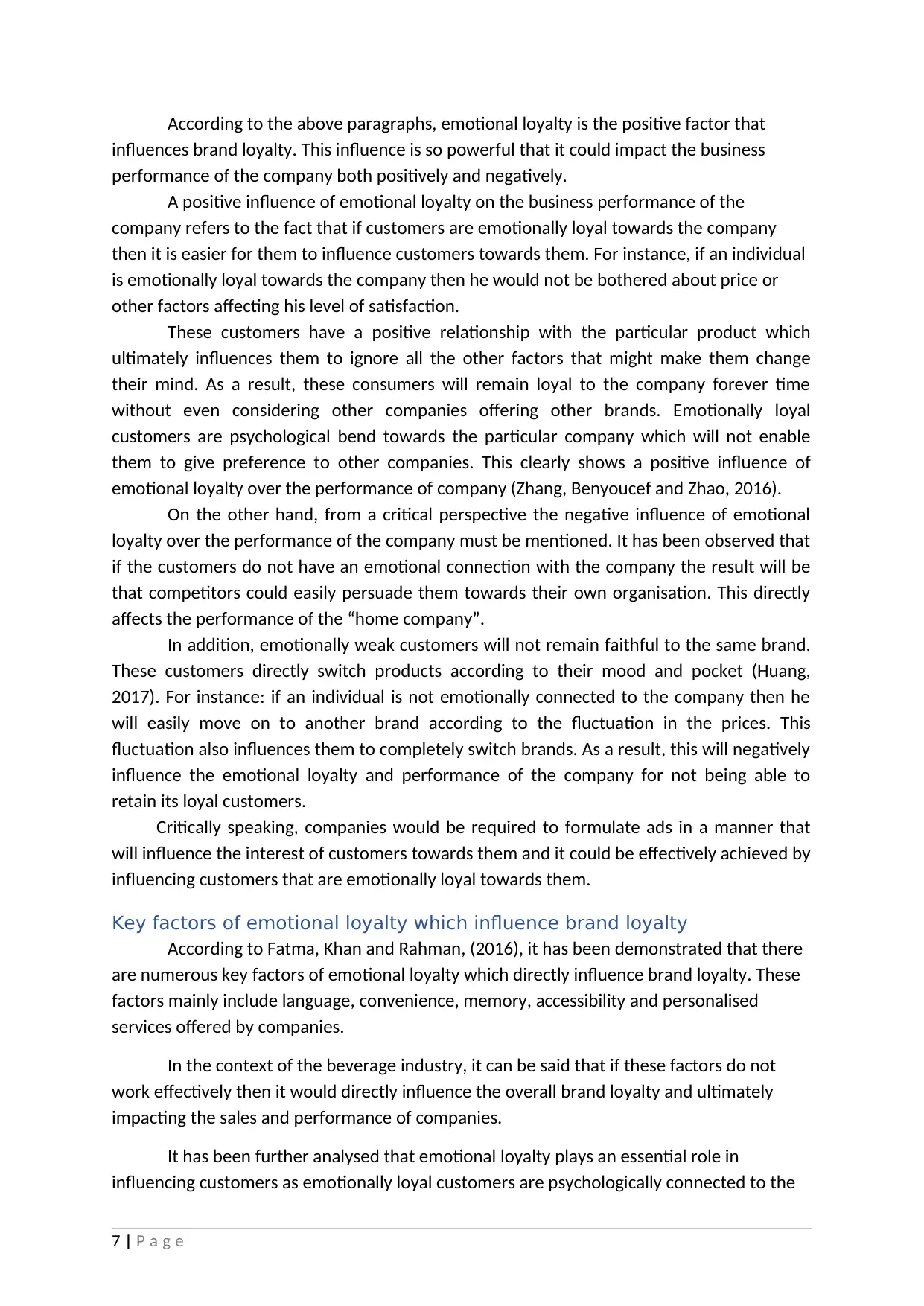
According to the above paragraphs, emotional loyalty is the positive factor that
influences brand loyalty. This influence is so powerful that it could impact the business
performance of the company both positively and negatively.
A positive influence of emotional loyalty on the business performance of the
company refers to the fact that if customers are emotionally loyal towards the company
then it is easier for them to influence customers towards them. For instance, if an individual
is emotionally loyal towards the company then he would not be bothered about price or
other factors affecting his level of satisfaction.
These customers have a positive relationship with the particular product which
ultimately influences them to ignore all the other factors that might make them change
their mind. As a result, these consumers will remain loyal to the company forever time
without even considering other companies offering other brands. Emotionally loyal
customers are psychological bend towards the particular company which will not enable
them to give preference to other companies. This clearly shows a positive influence of
emotional loyalty over the performance of company (Zhang, Benyoucef and Zhao, 2016).
On the other hand, from a critical perspective the negative influence of emotional
loyalty over the performance of the company must be mentioned. It has been observed that
if the customers do not have an emotional connection with the company the result will be
that competitors could easily persuade them towards their own organisation. This directly
affects the performance of the “home company”.
In addition, emotionally weak customers will not remain faithful to the same brand.
These customers directly switch products according to their mood and pocket (Huang,
2017). For instance: if an individual is not emotionally connected to the company then he
will easily move on to another brand according to the fluctuation in the prices. This
fluctuation also influences them to completely switch brands. As a result, this will negatively
influence the emotional loyalty and performance of the company for not being able to
retain its loyal customers.
Critically speaking, companies would be required to formulate ads in a manner that
will influence the interest of customers towards them and it could be effectively achieved by
influencing customers that are emotionally loyal towards them.
Key factors of emotional loyalty which influence brand loyalty
According to Fatma, Khan and Rahman, (2016), it has been demonstrated that there
are numerous key factors of emotional loyalty which directly influence brand loyalty. These
factors mainly include language, convenience, memory, accessibility and personalised
services offered by companies.
In the context of the beverage industry, it can be said that if these factors do not
work effectively then it would directly influence the overall brand loyalty and ultimately
impacting the sales and performance of companies.
It has been further analysed that emotional loyalty plays an essential role in
influencing customers as emotionally loyal customers are psychologically connected to the
7 | P a g e
influences brand loyalty. This influence is so powerful that it could impact the business
performance of the company both positively and negatively.
A positive influence of emotional loyalty on the business performance of the
company refers to the fact that if customers are emotionally loyal towards the company
then it is easier for them to influence customers towards them. For instance, if an individual
is emotionally loyal towards the company then he would not be bothered about price or
other factors affecting his level of satisfaction.
These customers have a positive relationship with the particular product which
ultimately influences them to ignore all the other factors that might make them change
their mind. As a result, these consumers will remain loyal to the company forever time
without even considering other companies offering other brands. Emotionally loyal
customers are psychological bend towards the particular company which will not enable
them to give preference to other companies. This clearly shows a positive influence of
emotional loyalty over the performance of company (Zhang, Benyoucef and Zhao, 2016).
On the other hand, from a critical perspective the negative influence of emotional
loyalty over the performance of the company must be mentioned. It has been observed that
if the customers do not have an emotional connection with the company the result will be
that competitors could easily persuade them towards their own organisation. This directly
affects the performance of the “home company”.
In addition, emotionally weak customers will not remain faithful to the same brand.
These customers directly switch products according to their mood and pocket (Huang,
2017). For instance: if an individual is not emotionally connected to the company then he
will easily move on to another brand according to the fluctuation in the prices. This
fluctuation also influences them to completely switch brands. As a result, this will negatively
influence the emotional loyalty and performance of the company for not being able to
retain its loyal customers.
Critically speaking, companies would be required to formulate ads in a manner that
will influence the interest of customers towards them and it could be effectively achieved by
influencing customers that are emotionally loyal towards them.
Key factors of emotional loyalty which influence brand loyalty
According to Fatma, Khan and Rahman, (2016), it has been demonstrated that there
are numerous key factors of emotional loyalty which directly influence brand loyalty. These
factors mainly include language, convenience, memory, accessibility and personalised
services offered by companies.
In the context of the beverage industry, it can be said that if these factors do not
work effectively then it would directly influence the overall brand loyalty and ultimately
impacting the sales and performance of companies.
It has been further analysed that emotional loyalty plays an essential role in
influencing customers as emotionally loyal customers are psychologically connected to the
7 | P a g e
Paraphrase This Document
Need a fresh take? Get an instant paraphrase of this document with our AI Paraphraser
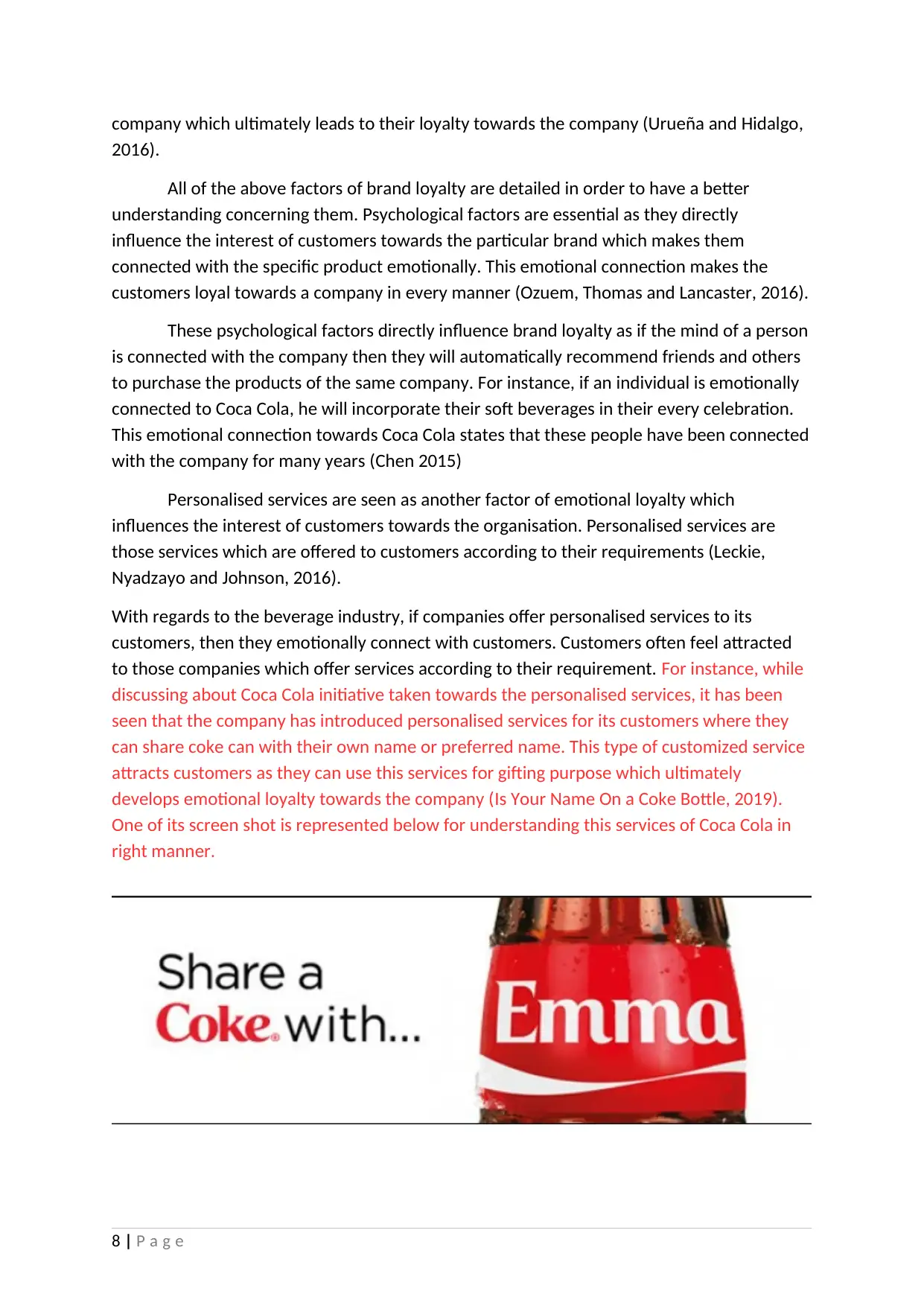
company which ultimately leads to their loyalty towards the company (Urueña and Hidalgo,
2016).
All of the above factors of brand loyalty are detailed in order to have a better
understanding concerning them. Psychological factors are essential as they directly
influence the interest of customers towards the particular brand which makes them
connected with the specific product emotionally. This emotional connection makes the
customers loyal towards a company in every manner (Ozuem, Thomas and Lancaster, 2016).
These psychological factors directly influence brand loyalty as if the mind of a person
is connected with the company then they will automatically recommend friends and others
to purchase the products of the same company. For instance, if an individual is emotionally
connected to Coca Cola, he will incorporate their soft beverages in their every celebration.
This emotional connection towards Coca Cola states that these people have been connected
with the company for many years (Chen 2015)
Personalised services are seen as another factor of emotional loyalty which
influences the interest of customers towards the organisation. Personalised services are
those services which are offered to customers according to their requirements (Leckie,
Nyadzayo and Johnson, 2016).
With regards to the beverage industry, if companies offer personalised services to its
customers, then they emotionally connect with customers. Customers often feel attracted
to those companies which offer services according to their requirement. For instance, while
discussing about Coca Cola initiative taken towards the personalised services, it has been
seen that the company has introduced personalised services for its customers where they
can share coke can with their own name or preferred name. This type of customized service
attracts customers as they can use this services for gifting purpose which ultimately
develops emotional loyalty towards the company (Is Your Name On a Coke Bottle, 2019).
One of its screen shot is represented below for understanding this services of Coca Cola in
right manner.
8 | P a g e
2016).
All of the above factors of brand loyalty are detailed in order to have a better
understanding concerning them. Psychological factors are essential as they directly
influence the interest of customers towards the particular brand which makes them
connected with the specific product emotionally. This emotional connection makes the
customers loyal towards a company in every manner (Ozuem, Thomas and Lancaster, 2016).
These psychological factors directly influence brand loyalty as if the mind of a person
is connected with the company then they will automatically recommend friends and others
to purchase the products of the same company. For instance, if an individual is emotionally
connected to Coca Cola, he will incorporate their soft beverages in their every celebration.
This emotional connection towards Coca Cola states that these people have been connected
with the company for many years (Chen 2015)
Personalised services are seen as another factor of emotional loyalty which
influences the interest of customers towards the organisation. Personalised services are
those services which are offered to customers according to their requirements (Leckie,
Nyadzayo and Johnson, 2016).
With regards to the beverage industry, if companies offer personalised services to its
customers, then they emotionally connect with customers. Customers often feel attracted
to those companies which offer services according to their requirement. For instance, while
discussing about Coca Cola initiative taken towards the personalised services, it has been
seen that the company has introduced personalised services for its customers where they
can share coke can with their own name or preferred name. This type of customized service
attracts customers as they can use this services for gifting purpose which ultimately
develops emotional loyalty towards the company (Is Your Name On a Coke Bottle, 2019).
One of its screen shot is represented below for understanding this services of Coca Cola in
right manner.
8 | P a g e
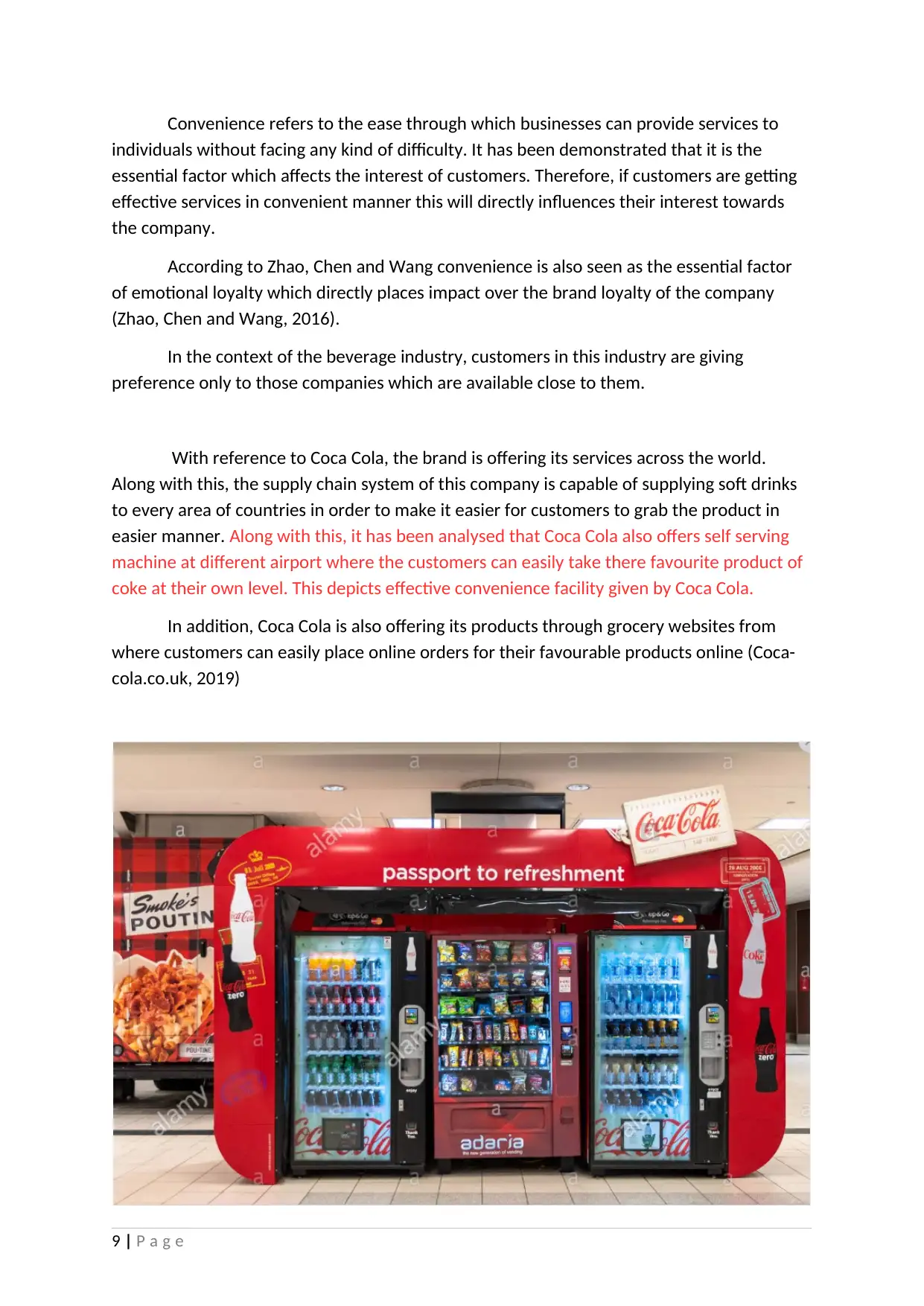
Convenience refers to the ease through which businesses can provide services to
individuals without facing any kind of difficulty. It has been demonstrated that it is the
essential factor which affects the interest of customers. Therefore, if customers are getting
effective services in convenient manner this will directly influences their interest towards
the company.
According to Zhao, Chen and Wang convenience is also seen as the essential factor
of emotional loyalty which directly places impact over the brand loyalty of the company
(Zhao, Chen and Wang, 2016).
In the context of the beverage industry, customers in this industry are giving
preference only to those companies which are available close to them.
With reference to Coca Cola, the brand is offering its services across the world.
Along with this, the supply chain system of this company is capable of supplying soft drinks
to every area of countries in order to make it easier for customers to grab the product in
easier manner. Along with this, it has been analysed that Coca Cola also offers self serving
machine at different airport where the customers can easily take there favourite product of
coke at their own level. This depicts effective convenience facility given by Coca Cola.
In addition, Coca Cola is also offering its products through grocery websites from
where customers can easily place online orders for their favourable products online (Coca-
cola.co.uk, 2019)
9 | P a g e
individuals without facing any kind of difficulty. It has been demonstrated that it is the
essential factor which affects the interest of customers. Therefore, if customers are getting
effective services in convenient manner this will directly influences their interest towards
the company.
According to Zhao, Chen and Wang convenience is also seen as the essential factor
of emotional loyalty which directly places impact over the brand loyalty of the company
(Zhao, Chen and Wang, 2016).
In the context of the beverage industry, customers in this industry are giving
preference only to those companies which are available close to them.
With reference to Coca Cola, the brand is offering its services across the world.
Along with this, the supply chain system of this company is capable of supplying soft drinks
to every area of countries in order to make it easier for customers to grab the product in
easier manner. Along with this, it has been analysed that Coca Cola also offers self serving
machine at different airport where the customers can easily take there favourite product of
coke at their own level. This depicts effective convenience facility given by Coca Cola.
In addition, Coca Cola is also offering its products through grocery websites from
where customers can easily place online orders for their favourable products online (Coca-
cola.co.uk, 2019)
9 | P a g e
⊘ This is a preview!⊘
Do you want full access?
Subscribe today to unlock all pages.

Trusted by 1+ million students worldwide
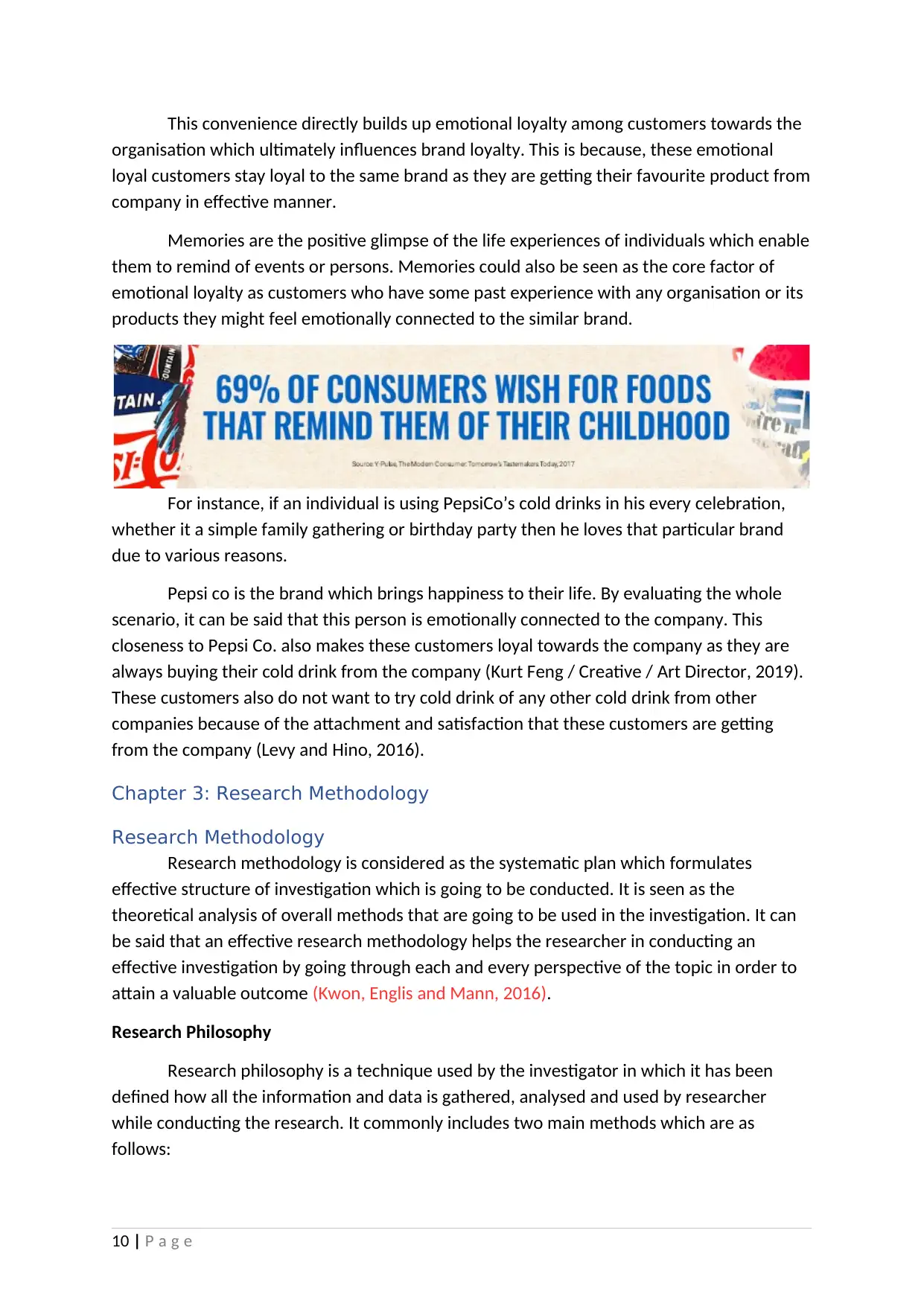
This convenience directly builds up emotional loyalty among customers towards the
organisation which ultimately influences brand loyalty. This is because, these emotional
loyal customers stay loyal to the same brand as they are getting their favourite product from
company in effective manner.
Memories are the positive glimpse of the life experiences of individuals which enable
them to remind of events or persons. Memories could also be seen as the core factor of
emotional loyalty as customers who have some past experience with any organisation or its
products they might feel emotionally connected to the similar brand.
For instance, if an individual is using PepsiCo’s cold drinks in his every celebration,
whether it a simple family gathering or birthday party then he loves that particular brand
due to various reasons.
Pepsi co is the brand which brings happiness to their life. By evaluating the whole
scenario, it can be said that this person is emotionally connected to the company. This
closeness to Pepsi Co. also makes these customers loyal towards the company as they are
always buying their cold drink from the company (Kurt Feng / Creative / Art Director, 2019).
These customers also do not want to try cold drink of any other cold drink from other
companies because of the attachment and satisfaction that these customers are getting
from the company (Levy and Hino, 2016).
Chapter 3: Research Methodology
Research Methodology
Research methodology is considered as the systematic plan which formulates
effective structure of investigation which is going to be conducted. It is seen as the
theoretical analysis of overall methods that are going to be used in the investigation. It can
be said that an effective research methodology helps the researcher in conducting an
effective investigation by going through each and every perspective of the topic in order to
attain a valuable outcome (Kwon, Englis and Mann, 2016).
Research Philosophy
Research philosophy is a technique used by the investigator in which it has been
defined how all the information and data is gathered, analysed and used by researcher
while conducting the research. It commonly includes two main methods which are as
follows:
10 | P a g e
organisation which ultimately influences brand loyalty. This is because, these emotional
loyal customers stay loyal to the same brand as they are getting their favourite product from
company in effective manner.
Memories are the positive glimpse of the life experiences of individuals which enable
them to remind of events or persons. Memories could also be seen as the core factor of
emotional loyalty as customers who have some past experience with any organisation or its
products they might feel emotionally connected to the similar brand.
For instance, if an individual is using PepsiCo’s cold drinks in his every celebration,
whether it a simple family gathering or birthday party then he loves that particular brand
due to various reasons.
Pepsi co is the brand which brings happiness to their life. By evaluating the whole
scenario, it can be said that this person is emotionally connected to the company. This
closeness to Pepsi Co. also makes these customers loyal towards the company as they are
always buying their cold drink from the company (Kurt Feng / Creative / Art Director, 2019).
These customers also do not want to try cold drink of any other cold drink from other
companies because of the attachment and satisfaction that these customers are getting
from the company (Levy and Hino, 2016).
Chapter 3: Research Methodology
Research Methodology
Research methodology is considered as the systematic plan which formulates
effective structure of investigation which is going to be conducted. It is seen as the
theoretical analysis of overall methods that are going to be used in the investigation. It can
be said that an effective research methodology helps the researcher in conducting an
effective investigation by going through each and every perspective of the topic in order to
attain a valuable outcome (Kwon, Englis and Mann, 2016).
Research Philosophy
Research philosophy is a technique used by the investigator in which it has been
defined how all the information and data is gathered, analysed and used by researcher
while conducting the research. It commonly includes two main methods which are as
follows:
10 | P a g e
Paraphrase This Document
Need a fresh take? Get an instant paraphrase of this document with our AI Paraphraser
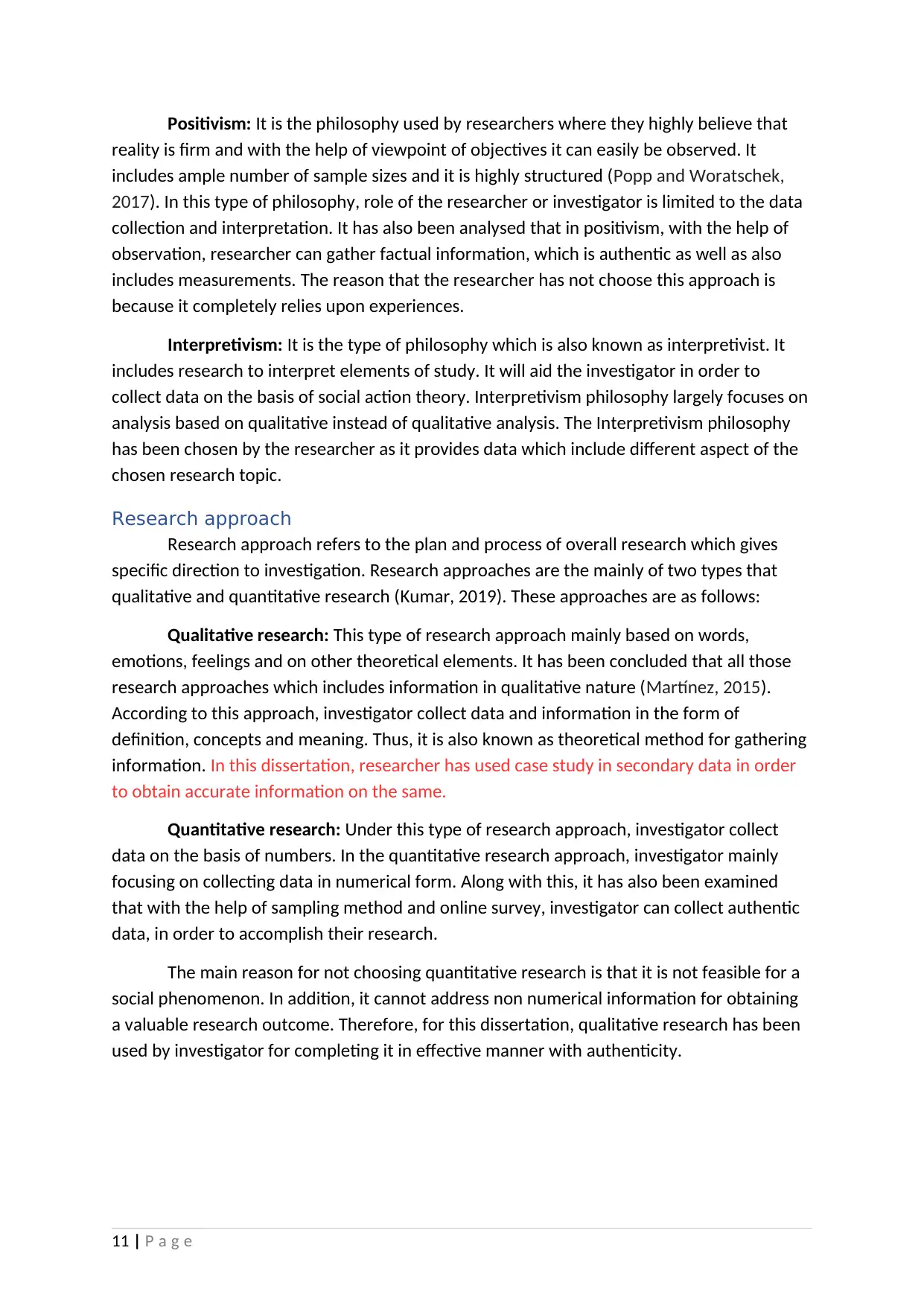
Positivism: It is the philosophy used by researchers where they highly believe that
reality is firm and with the help of viewpoint of objectives it can easily be observed. It
includes ample number of sample sizes and it is highly structured (Popp and Woratschek,
2017). In this type of philosophy, role of the researcher or investigator is limited to the data
collection and interpretation. It has also been analysed that in positivism, with the help of
observation, researcher can gather factual information, which is authentic as well as also
includes measurements. The reason that the researcher has not choose this approach is
because it completely relies upon experiences.
Interpretivism: It is the type of philosophy which is also known as interpretivist. It
includes research to interpret elements of study. It will aid the investigator in order to
collect data on the basis of social action theory. Interpretivism philosophy largely focuses on
analysis based on qualitative instead of qualitative analysis. The Interpretivism philosophy
has been chosen by the researcher as it provides data which include different aspect of the
chosen research topic.
Research approach
Research approach refers to the plan and process of overall research which gives
specific direction to investigation. Research approaches are the mainly of two types that
qualitative and quantitative research (Kumar, 2019). These approaches are as follows:
Qualitative research: This type of research approach mainly based on words,
emotions, feelings and on other theoretical elements. It has been concluded that all those
research approaches which includes information in qualitative nature (Martínez, 2015).
According to this approach, investigator collect data and information in the form of
definition, concepts and meaning. Thus, it is also known as theoretical method for gathering
information. In this dissertation, researcher has used case study in secondary data in order
to obtain accurate information on the same.
Quantitative research: Under this type of research approach, investigator collect
data on the basis of numbers. In the quantitative research approach, investigator mainly
focusing on collecting data in numerical form. Along with this, it has also been examined
that with the help of sampling method and online survey, investigator can collect authentic
data, in order to accomplish their research.
The main reason for not choosing quantitative research is that it is not feasible for a
social phenomenon. In addition, it cannot address non numerical information for obtaining
a valuable research outcome. Therefore, for this dissertation, qualitative research has been
used by investigator for completing it in effective manner with authenticity.
11 | P a g e
reality is firm and with the help of viewpoint of objectives it can easily be observed. It
includes ample number of sample sizes and it is highly structured (Popp and Woratschek,
2017). In this type of philosophy, role of the researcher or investigator is limited to the data
collection and interpretation. It has also been analysed that in positivism, with the help of
observation, researcher can gather factual information, which is authentic as well as also
includes measurements. The reason that the researcher has not choose this approach is
because it completely relies upon experiences.
Interpretivism: It is the type of philosophy which is also known as interpretivist. It
includes research to interpret elements of study. It will aid the investigator in order to
collect data on the basis of social action theory. Interpretivism philosophy largely focuses on
analysis based on qualitative instead of qualitative analysis. The Interpretivism philosophy
has been chosen by the researcher as it provides data which include different aspect of the
chosen research topic.
Research approach
Research approach refers to the plan and process of overall research which gives
specific direction to investigation. Research approaches are the mainly of two types that
qualitative and quantitative research (Kumar, 2019). These approaches are as follows:
Qualitative research: This type of research approach mainly based on words,
emotions, feelings and on other theoretical elements. It has been concluded that all those
research approaches which includes information in qualitative nature (Martínez, 2015).
According to this approach, investigator collect data and information in the form of
definition, concepts and meaning. Thus, it is also known as theoretical method for gathering
information. In this dissertation, researcher has used case study in secondary data in order
to obtain accurate information on the same.
Quantitative research: Under this type of research approach, investigator collect
data on the basis of numbers. In the quantitative research approach, investigator mainly
focusing on collecting data in numerical form. Along with this, it has also been examined
that with the help of sampling method and online survey, investigator can collect authentic
data, in order to accomplish their research.
The main reason for not choosing quantitative research is that it is not feasible for a
social phenomenon. In addition, it cannot address non numerical information for obtaining
a valuable research outcome. Therefore, for this dissertation, qualitative research has been
used by investigator for completing it in effective manner with authenticity.
11 | P a g e
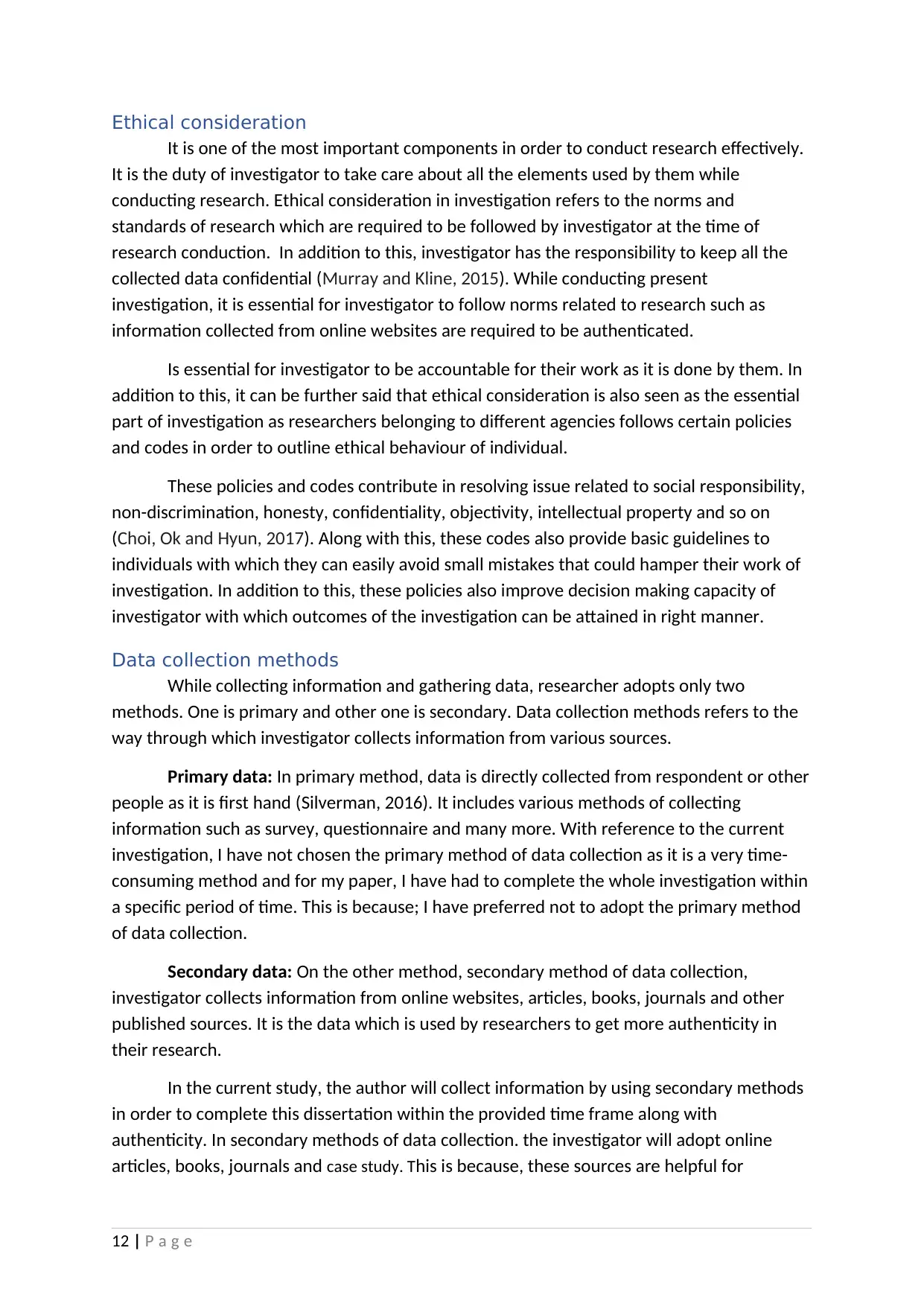
Ethical consideration
It is one of the most important components in order to conduct research effectively.
It is the duty of investigator to take care about all the elements used by them while
conducting research. Ethical consideration in investigation refers to the norms and
standards of research which are required to be followed by investigator at the time of
research conduction. In addition to this, investigator has the responsibility to keep all the
collected data confidential (Murray and Kline, 2015). While conducting present
investigation, it is essential for investigator to follow norms related to research such as
information collected from online websites are required to be authenticated.
Is essential for investigator to be accountable for their work as it is done by them. In
addition to this, it can be further said that ethical consideration is also seen as the essential
part of investigation as researchers belonging to different agencies follows certain policies
and codes in order to outline ethical behaviour of individual.
These policies and codes contribute in resolving issue related to social responsibility,
non-discrimination, honesty, confidentiality, objectivity, intellectual property and so on
(Choi, Ok and Hyun, 2017). Along with this, these codes also provide basic guidelines to
individuals with which they can easily avoid small mistakes that could hamper their work of
investigation. In addition to this, these policies also improve decision making capacity of
investigator with which outcomes of the investigation can be attained in right manner.
Data collection methods
While collecting information and gathering data, researcher adopts only two
methods. One is primary and other one is secondary. Data collection methods refers to the
way through which investigator collects information from various sources.
Primary data: In primary method, data is directly collected from respondent or other
people as it is first hand (Silverman, 2016). It includes various methods of collecting
information such as survey, questionnaire and many more. With reference to the current
investigation, I have not chosen the primary method of data collection as it is a very time-
consuming method and for my paper, I have had to complete the whole investigation within
a specific period of time. This is because; I have preferred not to adopt the primary method
of data collection.
Secondary data: On the other method, secondary method of data collection,
investigator collects information from online websites, articles, books, journals and other
published sources. It is the data which is used by researchers to get more authenticity in
their research.
In the current study, the author will collect information by using secondary methods
in order to complete this dissertation within the provided time frame along with
authenticity. In secondary methods of data collection. the investigator will adopt online
articles, books, journals and case study. This is because, these sources are helpful for
12 | P a g e
It is one of the most important components in order to conduct research effectively.
It is the duty of investigator to take care about all the elements used by them while
conducting research. Ethical consideration in investigation refers to the norms and
standards of research which are required to be followed by investigator at the time of
research conduction. In addition to this, investigator has the responsibility to keep all the
collected data confidential (Murray and Kline, 2015). While conducting present
investigation, it is essential for investigator to follow norms related to research such as
information collected from online websites are required to be authenticated.
Is essential for investigator to be accountable for their work as it is done by them. In
addition to this, it can be further said that ethical consideration is also seen as the essential
part of investigation as researchers belonging to different agencies follows certain policies
and codes in order to outline ethical behaviour of individual.
These policies and codes contribute in resolving issue related to social responsibility,
non-discrimination, honesty, confidentiality, objectivity, intellectual property and so on
(Choi, Ok and Hyun, 2017). Along with this, these codes also provide basic guidelines to
individuals with which they can easily avoid small mistakes that could hamper their work of
investigation. In addition to this, these policies also improve decision making capacity of
investigator with which outcomes of the investigation can be attained in right manner.
Data collection methods
While collecting information and gathering data, researcher adopts only two
methods. One is primary and other one is secondary. Data collection methods refers to the
way through which investigator collects information from various sources.
Primary data: In primary method, data is directly collected from respondent or other
people as it is first hand (Silverman, 2016). It includes various methods of collecting
information such as survey, questionnaire and many more. With reference to the current
investigation, I have not chosen the primary method of data collection as it is a very time-
consuming method and for my paper, I have had to complete the whole investigation within
a specific period of time. This is because; I have preferred not to adopt the primary method
of data collection.
Secondary data: On the other method, secondary method of data collection,
investigator collects information from online websites, articles, books, journals and other
published sources. It is the data which is used by researchers to get more authenticity in
their research.
In the current study, the author will collect information by using secondary methods
in order to complete this dissertation within the provided time frame along with
authenticity. In secondary methods of data collection. the investigator will adopt online
articles, books, journals and case study. This is because, these sources are helpful for
12 | P a g e
⊘ This is a preview!⊘
Do you want full access?
Subscribe today to unlock all pages.

Trusted by 1+ million students worldwide
1 out of 39
Related Documents
Your All-in-One AI-Powered Toolkit for Academic Success.
+13062052269
info@desklib.com
Available 24*7 on WhatsApp / Email
![[object Object]](/_next/static/media/star-bottom.7253800d.svg)
Unlock your academic potential
Copyright © 2020–2026 A2Z Services. All Rights Reserved. Developed and managed by ZUCOL.





